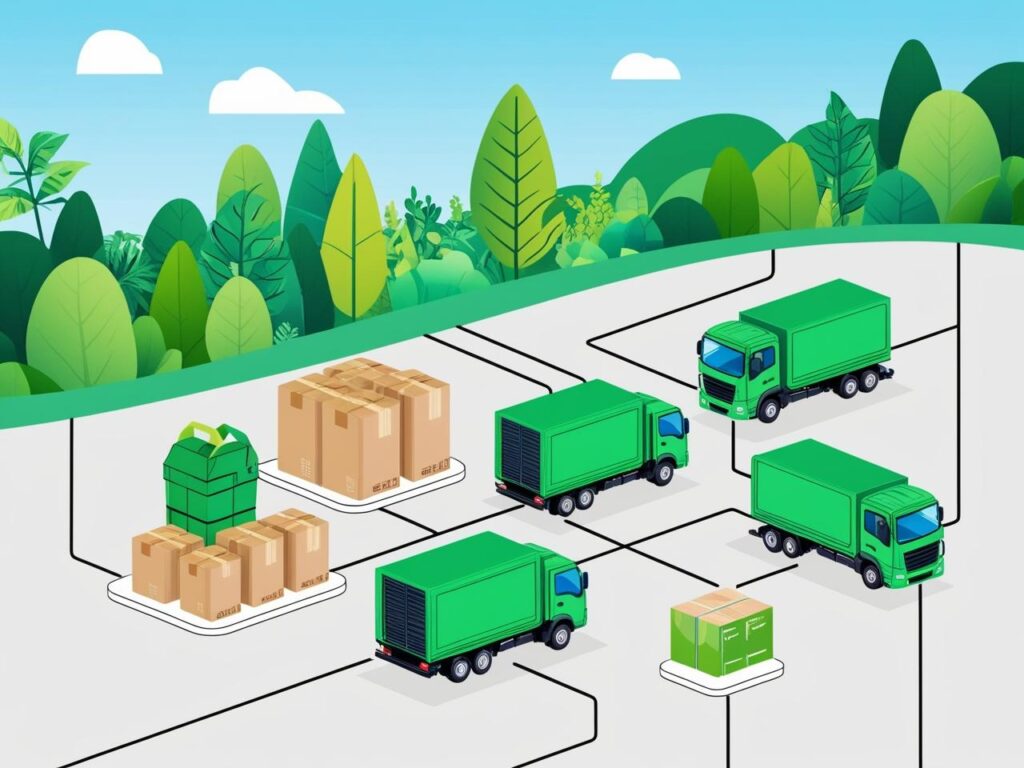
Green logistics is an increasingly important concept in the logistics world that focuses on efficiently managing the distribution of goods while minimizing negative impacts on the environment. In recent decades, awareness of climate change, air pollution, and environmental degradation has prompted logistics companies to adopt greener practices. This aims to optimize all lines of production processes that do not adversely affect the environment, from resource use efficiency to sustainability. In this article, we will discuss what green logistics is and how it is applied in the logistics industry, as well as efforts to reduce carbon footprint and comply with environmental regulations.
What is green logistics?
Green logistics is an approach in the logistics industry that focuses on reducing the environmental impact of the process of transporting, storing, and distributing goods. The main focus of green logistics is the reduction of carbon emissions, energy savings, waste management, and the use of environmentally friendly packaging materials. All logistics processes must fulfill this focus, starting from vehicles, alternative energy, and effective routes that do not have an adverse impact on the environment.
Green Logistics Practices in the Logistics Industry
The implementation of green logistics in the logistics industry involves several aspects that can reduce the negative impact on the environment. Here are some of the key practices implemented in green logistics:
1. Use of Environmentally Friendly Vehicles
The use of environmentally friendly vehicles such as electric and hydrogen vehicles is becoming a major focus in the logistics industry. Logistics companies are starting to switch from fossil fuel vehicles to electric vehicles or vehicles that run on alternative fuels, such as compressed natural gas (CNG) or biofuels. Electric vehicles, for example, reduce carbon emissions and air pollution, which is especially important in major cities with high pollution levels.
Application Example:
- Electric Trucks: Logistics companies like DHL and FedEx have started implementing electric trucks for the delivery of goods in select cities. These electric trucks not only reduce carbon emissions but also reduce noise in urban areas.
- Alternative-Fueled Transportation: In addition to electric trucks, the company also uses alternative fuel vehicles that are more environmentally friendly than traditional diesel vehicles.
2. Delivery Route Optimization
Optimizing routes is one way to reduce carbon emissions. By using technologies such as transportation management systems (TMS) and artificial intelligence (AI), companies can plan the most efficient delivery routes, avoid congestion, and reduce mileage. With route optimization, companies can reduce costs and speed up delivery.
3. Reducing the Use of Plastic Packaging
The use of single-use plastic packaging is one of the biggest problems in logistics that adversely affects the environment. To combat this, many logistics companies are turning to more environmentally friendly packaging materials, such as recyclable, biodegradable, or natural-based packaging.
Application Example:
- Use of Recycled Packaging: Companies like Amazon and IKEA have started reducing the use of plastic in their product packaging and switching to recycled materials.
- Environmentally Friendly Packaging: Some logistics companies also use biodegradable or reusable packaging materials, reducing wastage and supporting sustainability.
4. Application of Technology to Improve Warehouse Efficiency
Green logistics also includes the application of technology to manage energy more efficiently in warehouse facilities. Logistics companies use technology to reduce energy consumption, such as LED lighting systems, automatic temperature control, and the use of renewable energy (e.g., solar panels).
Application Example:
- Use of Renewable Energy: Companies like Walmart and Amazon have integrated the use of renewable energy in their facilities, such as the installation of solar panels to reduce dependence on fossil energy.
5. Waste Management and Recycling
Waste management is an important aspect of green logistics. Many logistics companies are now focusing on reducing waste and recycling materials used in the logistics process, such as packaging materials and damaged goods.
Application Example:
- Efficient Waste Management: Logistics companies are starting to implement policies to reduce waste, such as recycling packaging and damaged goods and reusing materials that can still be used.
- Zero-Waste Initiatives: Some logistics companies have initiatives to achieve “zero-waste,” which means reducing the amount of waste going to landfills by recycling or composting the waste.
Rules and Policies Related to Green Logistics
As climate change becomes a growing concern, many countries and international organizations are beginning to enact policies that encourage green logistics practices. In the European Union, for example, there are regulations that require companies to reduce carbon emissions and use more environmentally friendly vehicles in the transportation of goods. In Indonesia, although regulations on green logistics are not as stringent as in some developed countries, logistics companies are starting to be encouraged to follow suit through government incentives and green policies.
Green logistics is no longer just a trend but a necessity for the logistics industry to reduce its impact on the environment. By implementing eco-friendly vehicles, optimizing delivery routes, reducing plastic usage, and managing energy efficiently, logistics companies can contribute to the sustainability of the planet. Through the S1 Digital Supply Chain program, students are prepared to be part of this change by understanding the technologies and practices that support green logistics. Sustainability in logistics not only improves operational efficiency but also has a positive impact on the environment and society as a whole.
Tags: Digital Supply Chain | S1 Teknik Logistik | S1 Teknik Logistik Telkom University | Telkom University